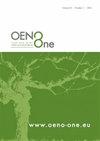The origin of the particular aroma of noble rot wines: various fungi contribute to the development of the aroma profile of botrytised grape berries
IF 2.2
3区 农林科学
Q3 FOOD SCIENCE & TECHNOLOGY
引用次数: 0
Abstract
During noble rot (NR), B. cinerea, together with other filamentous fungi and yeasts, play a role in developing the unique aromatic profile of botrytised wines. To gain more insight into the latter, we generated metatranscriptomic data representing the four NR stages (I-IV) from the Tokaj wine region of Hungary over three months. Since previous research has indicated that the most prevalent filamentous fungi and yeast include Alternaria alternata, Botrytis cinerea, Epicoccum nigrum, Aureobasidium pullulans and Rhodotorula graminis, RNAseq reads were aligned to the latter species. A weighted gene co-expression network analysis (WGCNA) followed by a non-metric multidimensional scaling (NMDS), eigengene ANOVA and enrichment analyses were performed. Amongst the ten generated gene module clusters, enriched pathways involved in synthesising aromatic compounds such as amino acid-, carbohydrate- and lipid metabolism co-jointly expressed by all filamentous fungi and yeast were identified within the turquoise module. Furthermore, it was found that the enzymes involved in the synthesis of aromatic compounds are expressed and up-regulated during the later stages (III-IV) of the NR process. This study has indicated that the unique aromatic profile of botrytised wines is due to the contributions of filamentous fungi and yeasts belonging to the NR grape microbiome, with the main aromatic contributions occurring during the later NR stages.贵腐葡萄酒特殊香气的来源:各种真菌有助于葡萄葡萄葡萄果实香气特征的发展
在贵腐病(NR)期间,灰葡萄球菌与其他丝状真菌和酵母一起,在形成葡萄孢葡萄酒独特的芳香特征方面发挥了作用。为了深入了解后者,我们生成了代表匈牙利托卡杰葡萄酒产区三个月内四个NR阶段(I-IV)的元转录组数据。由于先前的研究表明,最常见的丝状真菌和酵母包括Alternaria alternata、Botrytis cinerea、Epicoccus nigrum、Aureobasidium pullulans和Rhodotorula graminis,因此RNAseq读数与后一种一致。进行加权基因共表达网络分析(WGCNA),然后进行非度量多维标度(NMDS)、特征基因方差分析和富集分析。在生成的10个基因模块簇中,在绿松石模块中鉴定了参与合成芳香化合物的富集途径,如所有丝状真菌和酵母共同表达的氨基酸、碳水化合物和脂质代谢。此外,发现参与芳族化合物合成的酶在NR过程的后期阶段(III-IV)中表达并上调。这项研究表明,葡萄红葡萄酒独特的芳香特征是由于属于NR葡萄微生物组的丝状真菌和酵母的贡献,主要的芳香贡献发生在NR后期。
本文章由计算机程序翻译,如有差异,请以英文原文为准。
求助全文
约1分钟内获得全文
求助全文
来源期刊

OENO One
Agricultural and Biological Sciences-Food Science
CiteScore
4.40
自引率
13.80%
发文量
85
审稿时长
13 weeks
期刊介绍:
OENO One is a peer-reviewed journal that publishes original research, reviews, mini-reviews, short communications, perspectives and spotlights in the areas of viticulture, grapevine physiology, genomics and genetics, oenology, winemaking technology and processes, wine chemistry and quality, analytical chemistry, microbiology, sensory and consumer sciences, safety and health. OENO One belongs to the International Viticulture and Enology Society - IVES, an academic association dedicated to viticulture and enology.
 求助内容:
求助内容: 应助结果提醒方式:
应助结果提醒方式:


